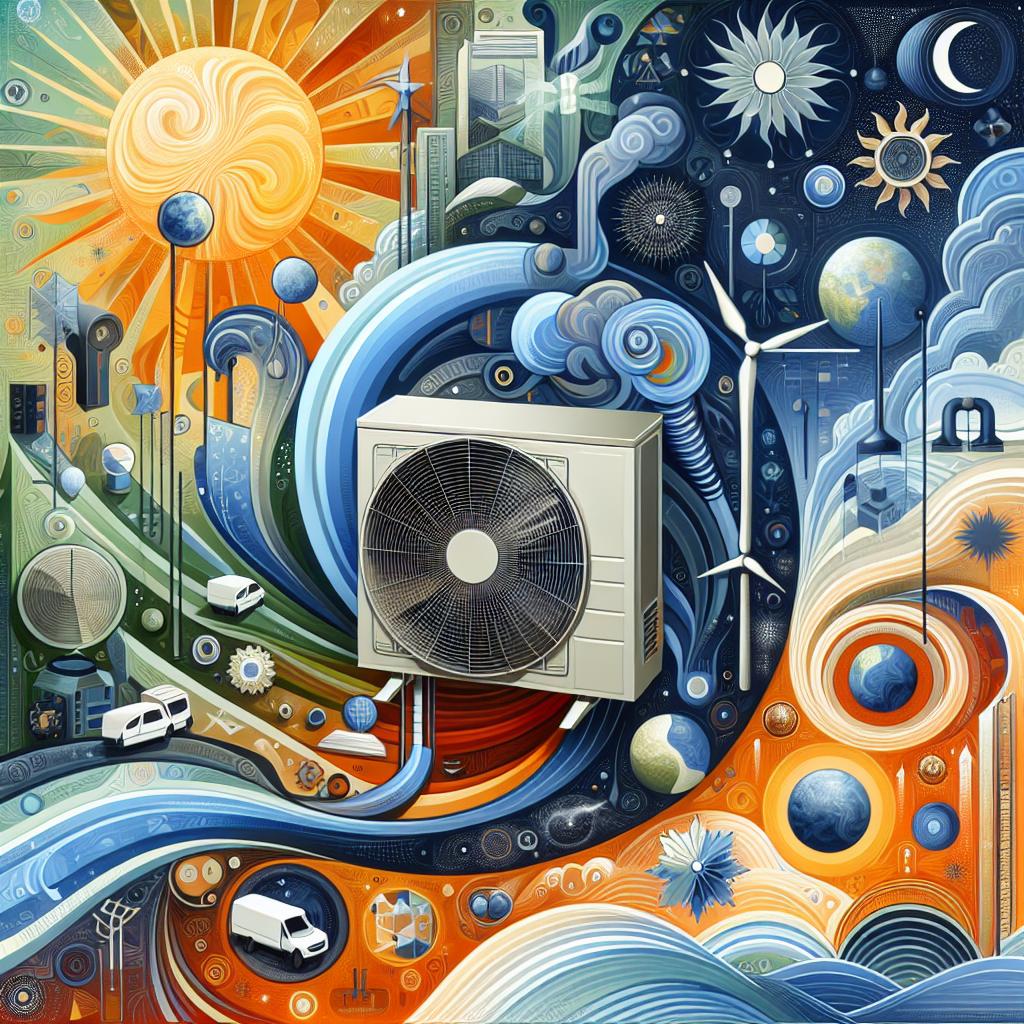When it comes to creating a cozy indoor environment, the question of how our heating, ventilation, and air conditioning (HVAC) systems operate is crucial yet ofen overlooked. Does your HVAC unit rely on the flick of an electrical switch, or does it draw upon the power of natural gas? As we navigate through the seasons and endure the extremes of weather, understanding the energy source behind HVAC systems can illuminate our choices as homeowners and consumers. This article delves into the various types of HVAC systems available, exploring the intricate dance between gas and electricity, and ultimately guiding you to make informed decisions that enhance both comfort and efficiency in your living spaces. Whether you’re seeking to reduce energy costs or looking to adopt more enduring practices, let’s unpack the essentials of HVAC energy sources.
Exploring the Energy Sources Behind HVAC Systems
When it comes to the energy sources powering HVAC systems, two primary contenders emerge: natural gas and electricity. Each energy source brings its own advantages and drawbacks, influencing efficiency, operational costs, and overall environmental impact. Gas-powered systems typically offer higher heating output, making them a popular choice in colder climates. they harness the combustion of natural gas to produce heat, which is then circulated throughout a building. Conversely, electric systems tend to have lower installation costs and are often simpler to maintain. Their operation relies on electric coils or heat pumps, which can be more efficient in milder temperatures but may face higher energy costs in colder conditions.
Understanding the key factors that differentiate these energy sources can definitely help homeowners make informed decisions.Consider the following aspects when evaluating HVAC options:
- Efficiency Ratings: look for systems with high Seasonal Energy Efficiency Ratios (SEER) for electric systems and Annual Fuel Utilization efficiency (AFUE) ratings for gas systems.
- Installation Costs: Gas systems generally require more extensive initial setup, including venting and gas lines.
- operating Costs: Fluctuating energy prices can affect both electricity and gas, impacting monthly utility bills.
- Environmental Impact: Electric systems can use renewable energy sources, while gas systems can produce carbon emissions.
| Energy Source | Advantages | Disadvantages |
|---|---|---|
| Natural Gas | High heating output; faster response time | Carbon emissions; requires gas line installation |
| Electricity | Lower installation costs; renewable options | Higher operating costs in colder climates |

Understanding the Efficiency of Gas versus Electric HVAC Units
When evaluating the efficiency of gas and electric HVAC systems, it’s essential to consider various factors that influence performance and operational costs. Gas units typically utilize natural gas or propane, boasting a faster heating response time and, in many cases, a lower cost per unit of energy compared to electricity. They are often preferred in colder climates where heating demands are higher. However, the efficiency of a gas furnace can vary based on its Annual Fuel Utilization Efficiency (AFUE) rating; units with higher ratings convert more gas to heat effectively, significantly impacting overall performance.
Conversely, electric HVAC units leverage electricity to power heat pumps or electric furnaces, offering a more seamless integration with renewable energy sources, such as solar power. While electric units generally have higher energy efficiency ratings, they can also lead to increased operational costs depending on local electricity rates. Particularly in milder climates, heat pumps provide an efficient alternative for both heating and cooling needs. Below is a comparison of key attributes of gas and electric HVAC systems:
| Feature | Gas HVAC Units | Electric HVAC Units |
|---|---|---|
| Initial Cost | Usually lower | Generally higher |
| Operating Cost | Frequently enough lower | Can be higher |
| Response Time | Quicker heating | Slower to heat |
| Environmental Impact | Higher carbon emissions | Lower emissions with renewable energy |
| Maintenance | Requires regular inspections | Less frequent maintenance |

Environmental Impact: Choosing sustainable Heating and Cooling solutions
When exploring efficient heating and cooling systems, it’s vital to consider the environmental consequences of your choices. Traditional HVAC systems often rely on fossil fuels,which can contribute significantly to greenhouse gas emissions. In contrast, sustainable alternatives, such as heat pumps and solar-powered units, not only minimize carbon footprints but can enhance energy efficiency. This shift is essential for creating a more sustainable future. By opting for electric systems that run on renewable energy sources, homeowners can drastically decrease their reliance on gas-based heating, making a positive impact on the planet.
Furthermore, the selection of heating and cooling technologies can affect resource consumption. Here are some key factors to consider when making your HVAC decision:
- Energy Efficiency Ratings: Look for systems with high SEER (Seasonal energy efficiency Ratio) and HSPF (Heating Seasonal Performance Factor) ratings.
- Renewable Energy Integration: Explore options that allow the use of solar panels or wind turbines to power your HVAC units.
- Maintenance and Lifecycle: Evaluate the longevity and maintenance needs of the system, as efficient systems tend to have lower operational costs over time.

Making the Right Choice: Factors Influencing HVAC Energy Source Selection
Choosing the ideal energy source for your HVAC system is influenced by several key factors that can significantly affect efficiency, cost, and environmental impact. Energy prices play a crucial role; fluctuations in the cost of natural gas and electricity can determine the most economical choice in different regions. Additionally, availability of resources must be considered—some areas may have a robust natural gas infrastructure while others rely heavily on electrical grids. Equally crucial are local climate conditions, as they dictate the energy demands of heating or cooling systems. As a notable example, regions with severe winters may benefit more from gas systems that provide rapid heating, while milder climates may rely on electric systems for efficiency and cost-effectiveness.
another basic aspect of energy source selection is environmental considerations. With an increasing emphasis on sustainability, homeowners may lean towards electric HVAC units powered by renewable energy sources such as wind or solar. The lifetime maintenance and operational costs of each system also bear meaning; gas systems generally require regular servicing to ensure safety and efficiency, while electric systems might offer lower maintenance needs but coudl incur higher electricity bills. local regulations and incentive programs can also guide your selection, as some places offer rebates for switching to energy-efficient systems or renewable technologies. This extensive assessment of these diverse elements can ultimately guide homeowners to make more informed decisions regarding their HVAC energy sources.
Q&A
Q&A: Does HVAC Use Gas or Electricity?
Q: What is HVAC, and what does it stand for?
A: HVAC stands for Heating, Ventilation, and Air Conditioning. It represents a system designed to control the indoor climate of a building, making it comfortable in both hot and cold weather. Essentially, it’s your home’s way of staying cozy in winter and refreshingly cool in summer.
Q: So, does HVAC primarily use gas or electricity?
A: It depends on the system and its configuration! HVAC systems can be powered by either gas, electricity, or a combination of both. As a notable example, traditional furnaces frequently enough run on natural gas, while most air conditioning units currently use electricity.
Q: Can you give examples of gas-powered HVAC systems?
A: absolutely! A common example is a natural gas furnace,which warms up air and distributes it through ductwork. additionally, gas boilers are utilized for heating water, which can then be circulated through radiators. There are also some gas heat pumps that can offer both heating and cooling in one system!
Q: What about electric HVAC systems? Are they different?
A: Yes, electric HVAC systems differ significantly. Electric furnaces heat air using electric coils, and they tend to be simpler to install. Air conditioners, as mentioned earlier, predominantly run on electricity.Moreover, heat pumps, which can both heat and cool, are another example of electric HVAC systems gaining popularity for their energy efficiency.
Q: Are there advantages or disadvantages to using gas over electric HVAC systems?
A: Good question! Gas systems generally provide heat more quickly and can be more cost-effective in some regions where gas prices are lower than electricity rates.However, they require venting and can be a safety hazard if not properly maintained. On the flip side, electric systems tend to require less maintenance and are considered safer but they can be more expensive to operate, depending on local electricity rates.
Q: How do homeowners choose between gas and electric HVAC options?
A: Homeowners typically consider several factors, such as local fuel prices, energy efficiency ratings, installation costs, and regional climate. Additionally, zoning laws and availability of gas lines can influence the decision. Consulting with an HVAC professional can be helpful in making an informed choice tailored to their specific needs.
Q: Is it possible to have a hybrid HVAC system?
A: Yes, indeed! Hybrid systems combine both gas and electric technologies for optimal efficiency and comfort. For instance, a dual-fuel heat pump can switch between gas or electric heat, depending on which is more cost-effective based on the outdoor temperature. This flexibility helps homeowners save on energy bills while ensuring their comfort year-round.
Q: which is better: gas or electric HVAC?
A: There’s no one-size-fits-all answer! The “better” choice ultimately depends on various factors including personal preferences, budget constraints, and environmental considerations.It’s wise for homeowners to evaluate their specific situation, local energy costs, and consult with professionals before committing to a particular system.
Whether gas or electricity power your HVAC system, both can efficiently keep your home comfortable, so the choice boils down to what fits your lifestyle and home best!
In Retrospect
the debate over whether HVAC systems utilize gas or electricity is not merely a matter of preference, but rather a reflection of broader considerations such as efficiency, environmental impact, and individual energy needs. As we’ve seen, both gas and electric systems have their unique advantages and drawbacks, making it essential for homeowners to evaluate their specific circumstances before making a choice. Whether it’s the quick warmth of gas or the versatility of electric options, understanding your heating and cooling preferences can lead to informed decisions that create a comfortable and sustainable living environment. As we move forward into an era focused on energy innovation, staying informed about HVAC technologies will empower you to make choices that align with both your comfort and your values.so, as you ponder your HVAC options, remember that the path to optimal climate control is illuminated by knowledge—and every choice contributes to a greener future.

